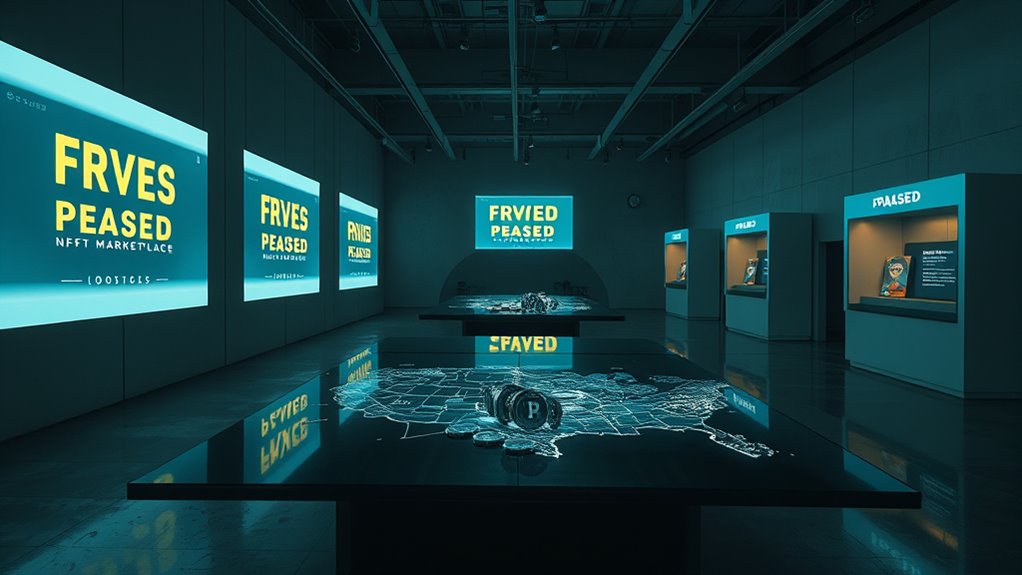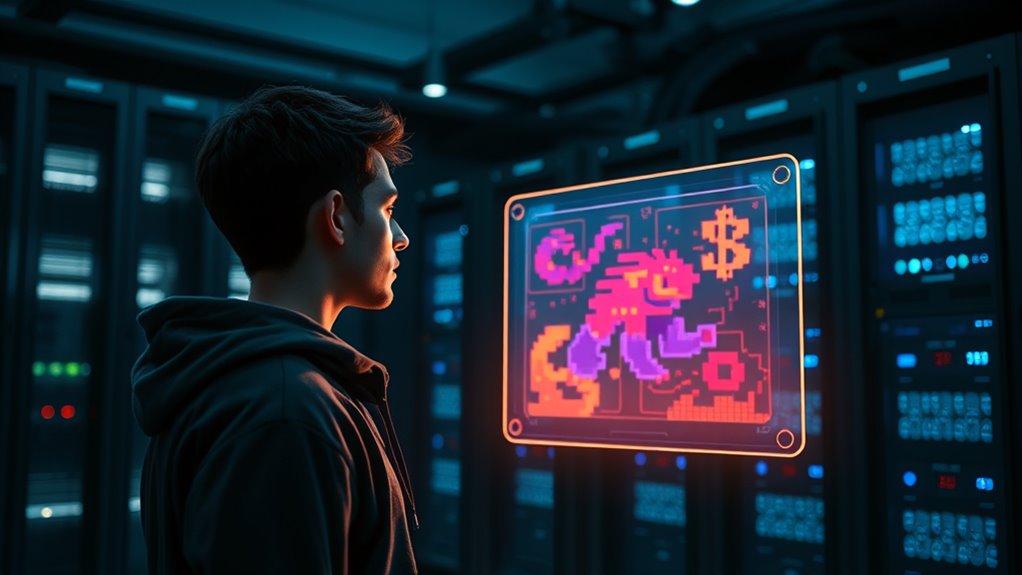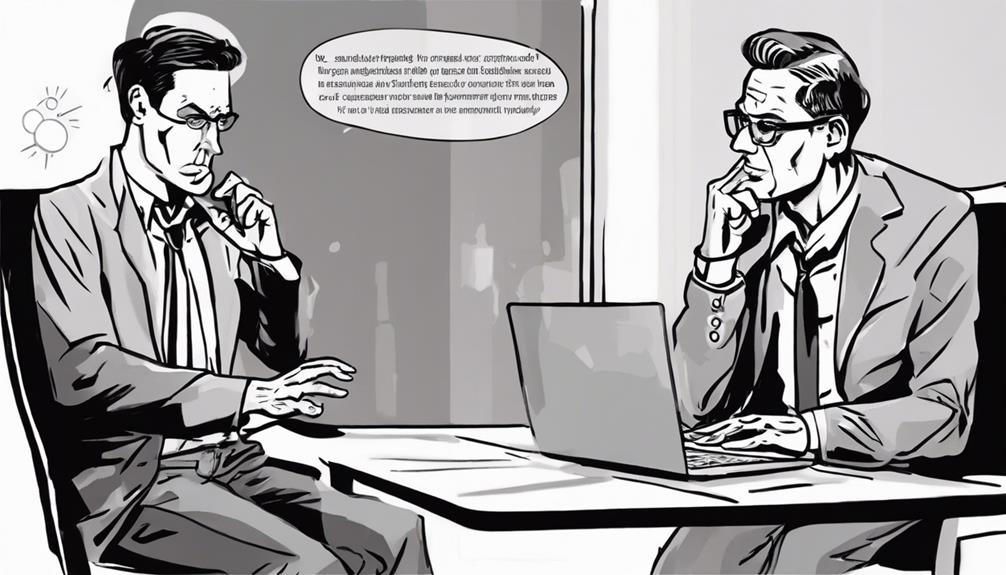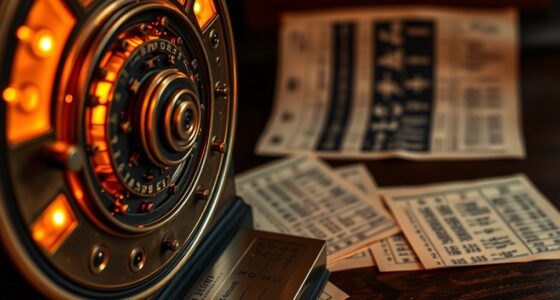If your NFT marketplace shuts down, your ownership rights remain secured on the blockchain, but accessing or transferring your assets might become tricky, especially if they were stored custodially on the platform. If you kept your NFTs in a personal wallet, you still control them, but without the platform’s support, verification or transfers may be harder. To truly safeguard your assets, you need to understand the nuances now and explore how you can stay protected.
Key Takeaways
- NFTs are recorded on blockchain, ensuring ownership persists even if the marketplace closes.
- Marketplace shutdown may limit access or transfer options if assets are held custodially.
- Properly transferring NFTs to personal wallets safeguards assets from platform closure risks.
- Legal terms and platform policies influence what happens to assets after shutdown.
- Proactive management and understanding of ownership rights are essential for asset security.

The recent shutdown of a popular NFT marketplace has sent shockwaves through the digital art community. If you’ve invested time, money, or emotional value into your NFTs, you might be asking what happens to your digital ownership now. When a marketplace closes unexpectedly, it raises critical questions about the permanence of your ownership rights and the legal implications tied to your digital assets. Unlike traditional art or collectibles stored physically, NFTs are primarily secured through blockchain technology, which records your ownership. However, the marketplace acts as the intermediary that facilitates buying, selling, and sometimes storing these tokens. Once the platform disappears, you could find yourself stranded without easy access to your digital collection or the ability to transfer or resell your NFTs.
Your digital ownership depends heavily on the blockchain’s records, not the marketplace itself. Yet, many NFT platforms offer a user interface that simplifies transactions and provides a sense of security. When that platform shuts down, you might worry whether your NFTs still belong to you or if you’ve lost control. Generally, because blockchain ownership is decentralized and recorded on a public ledger, your NFTs remain secured on the blockchain. But the legal implications are less straightforward. If the marketplace was the primary way you interacted with your assets, you might face difficulties in verifying your ownership or transferring NFTs without platform support. Some marketplaces include terms that specify what happens if they cease operations, but these aren’t always clear or enforceable, especially if you haven’t read the fine print.
Blockchain records ensure ownership, but platform shutdowns can complicate transfer and verification processes.
You should also consider the possibility that some marketplaces act as custodians, holding your assets in their wallets, which complicates matters if they shut down unexpectedly. In such cases, your access could be limited or revoked unless you’ve taken steps to securely transfer your NFTs to your own digital wallet. If you haven’t, you risk losing access altogether, which underscores the importance of understanding digital ownership and the legal implications involved. Without proper precautions, you might find yourself unable to prove ownership or recover your assets if the marketplace disappears. Additionally, fostering a digital-friendly environment at home can help you stay informed and in control of your digital assets.
In essence, while blockchain technology offers a degree of permanence, the ecosystem surrounding NFTs is still evolving. When a marketplace shuts down, your ownership rights are technically intact on the blockchain, but practical access and legal clarity can become murky. To protect yourself, it’s essential to manage your NFTs independently, store them in personal wallets, and stay informed about the terms of service of the platforms you use. The key takeaway: your digital ownership is on the blockchain, but your ability to control and utilize your NFTs depends on proactive management and understanding the legal landscape.
Frequently Asked Questions
Can I Still Access My NFTS After the Marketplace Closes?
Yes, you can still access your NFTs after the marketplace closes if you retain ownership through the smart contract. Your NFTs exist on the blockchain, not just the platform, so platform interoperability guarantees you can view and transfer your assets using compatible wallets or other marketplaces. Just make sure you have your private keys or seed phrase secure, as these are essential for accessing your NFTs independently of any specific marketplace.
Will I Receive Any Compensation if the Marketplace Shuts Down?
Imagine your NFT as a ship sailing in a vast digital ocean, and the marketplace as its harbor. If the harbor closes, you won’t get marketplace compensation, but your ownership transfer remains intact. Your NFTs stay yours, stored securely in your wallet. You won’t receive financial compensation from the marketplace shutdown, but your ownership isn’t lost—you simply take the helm and navigate to a new marketplace or platform.
How Does Marketplace Shutdown Affect NFT Ownership Rights?
When a marketplace shuts down, your NFT ownership rights remain, but the process of ownership transfer may become complicated. You might need to transfer your NFTs to another platform to maintain control. Platform security is vital; make certain your private keys and wallet details are safe. Even if the marketplace closes, your rights to the NFTs are preserved, but you’ll need to take action to manage ownership transfer and safeguard your assets.
Can I Transfer My NFTS to Another Platform Easily?
You can transfer your NFTs to another platform, but it depends on smart contract security and cross-platform compatibility. Verify your NFTs are stored in a compatible digital wallet, and check if the new marketplace supports the same blockchain standards. Be aware that some platforms might have transfer restrictions or require additional steps for seamless migration. Properly understanding these factors helps you maintain ownership without risking loss or complications.
What Legal Steps Protect My NFTS During a Marketplace Closure?
When it comes to protecting your NFTs during a marketplace shutdown, it’s essential to understand that your legal ownership rights are typically secured through smart contract enforcement. While the marketplace might close its doors, your ownership remains intact on the blockchain. To safeguard your assets, make certain you’ve transferred NFTs to a personal wallet and keep documentation of your ownership rights. Remember, it’s better to be safe than sorry in this digital wild west.
Conclusion
Imagine your NFT collection is like a ship sailing the digital seas. If the marketplace docks unexpectedly, your ship doesn’t sink—your ownership remains yours, anchored in blockchain. The marketplace is just the harbor, not the ocean itself. So, even if the port closes, your treasures stay afloat, waiting for new docks to arrive. Your ownership persists, a steady lighthouse guiding you through the shifting tides of the NFT world.










